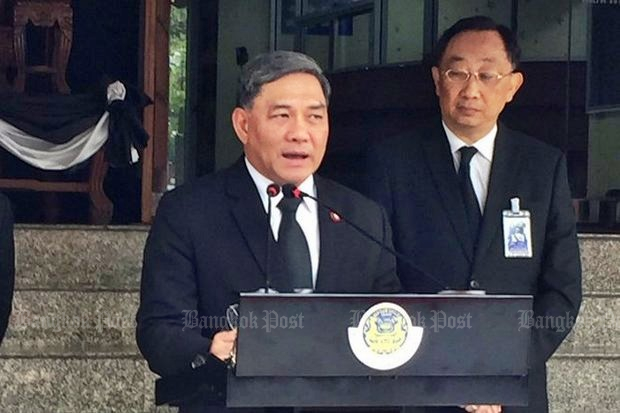
The committee on police reform is likely to reverse its decision to keep both criminal investigations and crime suppression work under the care of the police, the body said Wednesday.
Prime Minister Prayut Chan-o-cha wants them separated with investigations conducted by other figures including professionals who possess sound legal knowledge, said committee member Manit Suksomjit.
Gen Prayut earlier assigned his two deputies -- Gen Prawit Wongsuwon and Wissanu Krea-ngam -- to work with the committee and review its preliminary conclusions.
Gen Prawit oversees security policy, while Mr Wissanu is in charge of legal affairs.
Both deputy premiers are due to meet the committee on Monday to discuss ways of removing criminal investigations from police jurisdiction, Mr Manit said.
Several civil groups have made calls to this effect in the interests of greater transparency and efficiency.
Some have proposed public prosecutors be absorbed into a new body that can look into criminal cases independently.
Regarding the upcoming police reshuffle, Mr Manit said the committee has drawn up guidelines and is now working on draft amendments to the National Police Act.
The panel will pursue a transparent reshuffle that complies with Section 258 of the charter, which says there must be no interference and promotions should be based mainly on candidates' qualifications and seniority, Mr Manit added.
Meanwhile, the committee has agreed the Police Commission will consist of specialists including former police officers and non-police, he said.
The commission will retain the authority to appoint the national police chief but other appointments will be decided by the chain of command in 12 clusters, he said.
These clusters are the nine provincial police regions, the Border Patrol Police Bureau, the Metropolitan Police Bureau, and the Office of the Inspector General, he said.
Early this month, the police reform committee decided the Police Commission will have the final say in appointing the national police chief.
Gen Boonsrang Niumpradit, the panel chairman, said the committee decided that while the outgoing police chief will have the right to nominate his successor, the commission will make the decision.
He said the outgoing police chief can nominate more than one candidate to the Police Commission, and the commission will forward its preferred nomination to the prime minister for endorsement.
However, if the prime minister, who supervises the Royal Thai Police, rejects the nomination, the commission has to review its decision, he said.
Gen Boonsrang has said the new proposal would ensure independence and transparency in the selection of the police chief.
He insisted that by letting the outgoing police chief nominate names for his successor while the commission makes the pick will keep the police chief's nomination free from interference.